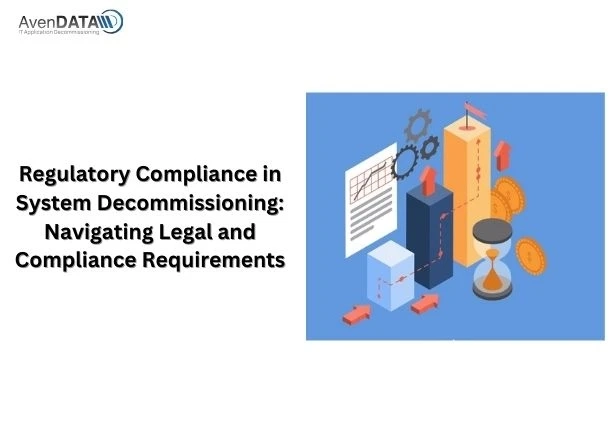In today’s digital age, businesses face increasing pressure to comply with a myriad of regulatory requirements governing data privacy, security, and retention. When it comes to system decommissioning, adherence to these regulations becomes even more critical, as improper handling of data during decommissioning can lead to severe legal and financial consequences. Navigating the complex landscape of regulatory compliance requires a comprehensive understanding of applicable laws and regulations, along with robust strategies to ensure compliance throughout the decommissioning process.
The Importance of Regulatory Compliance
Regulatory compliance is a top priority for organizations undergoing system decommissioning for several reasons:
Legal Obligations: Businesses are legally obligated to comply with various laws and regulations related to data protection, privacy, and security. Failure to adhere to these requirements can result in legal sanctions, fines, and reputational damage.Protecting Sensitive Information: System decommissioning involves handling sensitive data, including customer information, intellectual property, and financial records. Compliance measures help safeguard this information from unauthorized access, disclosure, or misuse.Maintaining Trust and Reputation: Compliance with regulatory standards demonstrates a commitment to ethical business practices and customer trust. Non-compliance can erode trust among stakeholders and damage the organization’s reputation.Mitigating Risks: Compliance efforts help identify and mitigate risks associated with data breaches, security incidents, and regulatory violations. By proactively addressing compliance requirements, organizations can reduce the likelihood of costly legal disputes and penalties.Key Regulatory Considerations in System Decommissioning
Data Privacy Regulations: Regulations such as the General Data Protection Regulation (GDPR) in Europe and the California Consumer Privacy Act (CCPA) in the United States impose strict requirements for the protection of personal data. Organizations must ensure that personal information is securely deleted or anonymized during system decommissioning to comply with these regulations.Data Security Standards: Compliance with industry-specific data security standards, such as the Payment Card Industry Data Security Standard (PCI DSS) or the Health Insurance Portability and Accountability Act (HIPAA), is essential for protecting sensitive data. Organizations must implement appropriate security measures to safeguard data during decommissioning and disposal.Data Retention Requirements: Certain regulations mandate specific data retention periods for different types of records. Organizations must adhere to these requirements when decommissioning systems to ensure compliance with legal and regulatory obligations.E-Discovery and Legal Hold Obligations: Organizations involved in legal proceedings or regulatory investigations must comply with e-discovery and legal hold obligations. System decommissioning efforts must account for the preservation of relevant data to fulfill these obligations and avoid sanctions for spoliation of evidence.Cross-Border Data Transfers: International data transfers are subject to restrictions and requirements under data protection laws such as the GDPR. Organizations must assess the impact of system decommissioning on cross-border data transfers and ensure compliance with applicable regulations.Best Practices for Regulatory Compliance in System Decommissioning
Conduct a Regulatory Impact Assessment: Before initiating system decommissioning, conduct a comprehensive assessment of relevant regulatory requirements and their implications for decommissioning activities.Engage Legal and Compliance Experts: Seek guidance from legal and compliance experts to interpret and navigate complex regulatory frameworks. Involve these stakeholders early in the decommissioning process to identify potential compliance risks and mitigation strategies.Develop a Compliance Plan: Create a detailed compliance plan that outlines specific measures and controls to ensure compliance with relevant regulations throughout the decommissioning lifecycle.Implement Data Governance Policies: Establish robust data governance policies and procedures to govern the handling, storage, and disposal of data during decommissioning. Ensure that data management practices align with regulatory requirements and industry best practices.Document Compliance Efforts: Maintain detailed documentation of compliance efforts, including risk assessments, mitigation plans, and audit trails. Documenting compliance activities demonstrates due diligence and provides evidence of regulatory compliance in the event of an audit or investigation.Provide Training and Awareness: Educate employees involved in the decommissioning process about their roles and responsibilities regarding regulatory compliance. Provide training on data protection principles, regulatory requirements, and best practices for handling sensitive information.Monitor and Audit Compliance Activities: Regularly monitor and audit compliance activities to ensure ongoing adherence to regulatory requirements. Conduct periodic reviews of decommissioning processes, documentation, and controls to identify areas for improvement and address any non-compliance issues promptly.Conclusion
Regulatory compliance is a fundamental aspect of system decommissioning, requiring organizations to navigate a complex landscape of legal and regulatory requirements. By understanding the regulatory obligations applicable to their operations and implementing robust compliance strategies, organizations can mitigate risks, protect sensitive information, and maintain trust with stakeholders. By prioritizing regulatory compliance throughout the decommissioning process, organizations can ensure a smooth and legally compliant transition to modernized IT environments.


